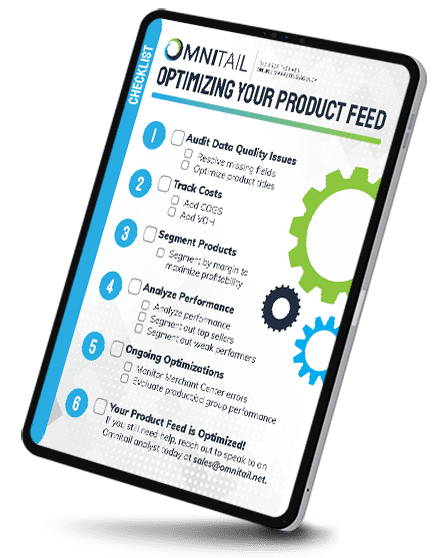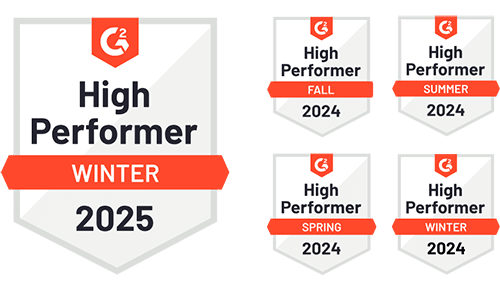Learn about the latest changes, updates, and industry trends in e-commerce marketing.
Welcome to our monthly Digital Marketing Round-Up! Each month, the Omnitail team discusses some of the top e-commerce and digital marketing news. We highlight upcoming changes, industry trends, and more.
This month, we dive into current industry news and trends that caught our attention, including things like the latest with Google Merchant Center and AI, the recent privacy changes coming with the public release of iOS 17 and its impact on mobile advertising, and GA4 adding 33 e-commerce dimensions. Here’s a breakdown:
GOOGLE NEWS
GA4 custom report builder adds 33 e-commerce dimensions, metrics
Google Analytics 4 added several new e-commerce dimensions and metrics to the custom reports builder to help marketers during the holiday shopping season. This change allows users to create reports from scratch and edit any standard e-commerce reports.
A few of the new e-commerce dimensions available are: Item brand, item category, item ID, and more. Additionally, some of the e-commerce metrics include things like gross purchase revenue, items added to cart, shipping amount, and others.
Why does this matter? The change helps you gain a better understanding of your campaigns so you can extract valuable insights and make data-informed decisions. Learn more about the new GA4 dimensions and metrics here.
New Google Merchant Center policy: AI-generated reviews are spam
Google Merchant Center’s new policy update doubles down on automated content, stating that any reviews generated using an automated program or artificial intelligence are considered spam and against policy.
In the past, Google hasn’t taken issue with utilizing AI to generate content when it’s helpful for users and not specifically created for search engines. But now, there’s a shift—Google will start disapproving reviews that are flagged as AI-generated content.
What does this mean? It’s important to stay updated on all of Google Merchant Center’s policies, especially as AI becomes more prominent. If your product review strategy includes posting reviews to your Merchant Center feed, you need to make sure these reviews aren’t AI generated, and if they are, it’s important to add the <is_spam> attribute to them. Learn more about the update here.
Google Ads broad match: What the data reveals for PPC marketers
When compared to exact and phrase match in Google Ads, broad match seems to be the weakest performer. According to the data, exact match has the highest click-through rate and phrase match has the highest cost-per-click and cost-per conversion.
Even being the “weaker” performer, there are ways to effectively use broad match to reach wider audiences and achieve better campaign results. For example, you can use negative keywords to exclude irrelevant searches and ad extensions to make advertisements more relevant.
Why is this important? Data-driven decisions in your Google Ads account matters. You should monitor your results and adjust your campaigns when necessary. If your CTR is low and/or your CPC is high, it might be time to adjust match types. And remember: Google Ads defaults to broad match, so if it’s truly not working for your brand, it’s time to adjust. Read more about what the data shows here.
Google Ads Performance Max upgrade tool now available for dynamic search ads (DSA)
Upgrading to Performance Max Campaigns just got a little easier after Google announced the self-upgrade tool for Dynamic Search Ads (DSA) and Google Display campaigns. Since Performance Max hit the scene in November 2021, it’s opened new opportunities and options for campaigns, including inventory-aware ad serving that automatically factors in your product inventory to ensure any out-of-stock pages don’t get served with Search ads.
Google started their automatic upgrade process when they announced they were upgrading Smart Shopping campaigns to Performance Max in July 2023. This current round of self-upgrade updates will gradually roll into Local campaigns and finish in September 2023.
Why does this matter? The self-upgrade tool eliminates the need to manually upgrade, meaning users will quickly be able to take advantage and utilize all the options and features Performance Max has to offer. Read more about the self-upgrade tool here.
INDUSTRY TRENDS
How could iOS 17 reshape mobile advertising?
Apple’s upcoming update to iOS 17 (releasing to the public this September) will introduce two major privacy enhancements that limit how users are tracked and re-targeted in Safari. The update includes link tracking protection that removes individual user tracking and privacy manifests that limit how user behavior is tracked. These privacy updates aren’t just limited to Safari—mail and messaging applications are also part of the update.
Link tracking removes any UTM parameter that identifies the user, such as unique click ID. Privacy manifests make it easier for developers to disclose their app’s privacy practices, which helps users gain insight into how their data is utilized.
What does this mean? Advertisers have to find a way to pivot and adapt to the limitations this update causes, meaning that focusing on what can still be collected is key. It’s always important to stay on top of major changes like these so you know how to move forward and optimize. Learn more about it here.








